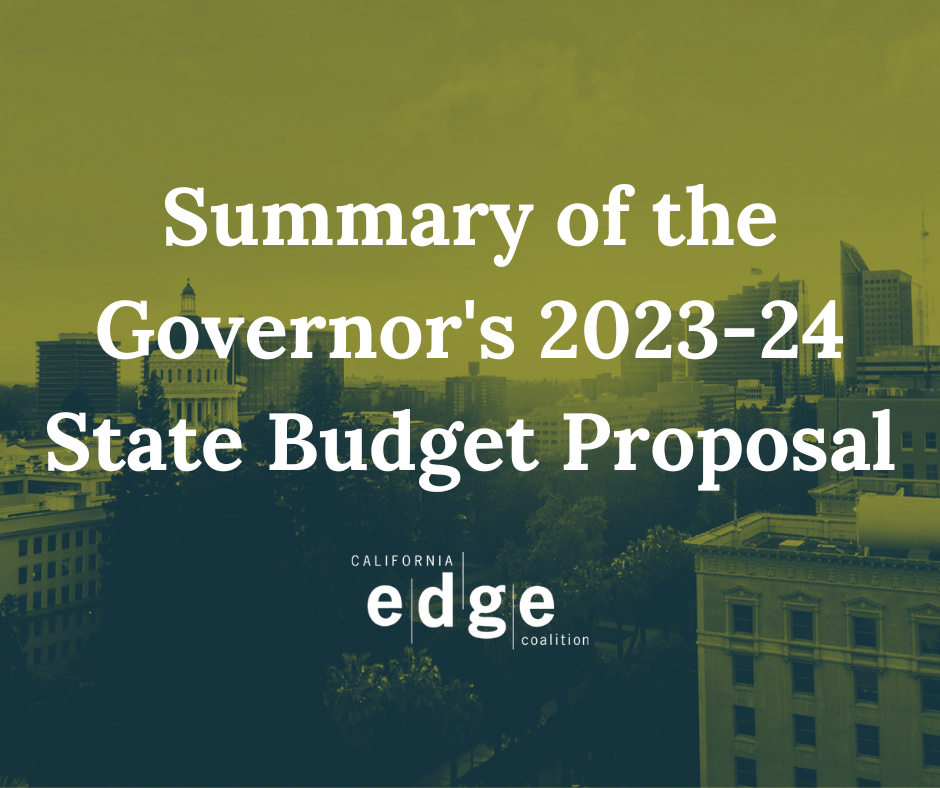On January 10th, Governor Newsom released the 2023-24 state budget proposal – a $297 billion spending plan that seeks to protect significant funding commitments made in previous budget cycles, and attempts to address a budget gap without using critical state reserves, all while trying to sustain existing state programs that support Californians who are facing rising costs of food, housing, and other socioeconomic barriers. Currently, the state is facing a projected $22.5 billion deficit, with general fund revenues estimated to be $29 billion lower than last year’s budget, and thus far has secured $35 billion in state reserves.

Despite this year’s budget shortfall, the budget proposal largely maintains historic investments made in last year’s budget, such as funding to support community colleges, student support services, career technical education, dual enrollment pathways, and other training programs intended to provide economic mobility for adult learners and opportunity youth.
However, the budget proposes to address the $22.5 billion deficit through various “trigger” cuts, funding delays, and several reductions of one-time spending that were approved within the last two years. Most notably, the budget reduces spending on various workforce development programs, contingent upon funding in 2024. As more budget details emerge in the coming months, California must remain a leader in centering equity and economic mobility for all Californians. EDGE stands ready to work with the Administration, Legislature, and partners to ensure industry, workers, adult learners, opportunity youth, and underserved communities are provided the support they need as we continue to navigate these economic uncertainties.
Provided below is an analysis of the proposed 2023-24 budget, which includes items that are aligned with EDGE’s 2023 Policy Priorities.
Higher education investments remain protected
Although California faces difficult budget projections this year, large investments made in recent years to support community colleges and students remain in place, such as funding to bolster dual enrollment pathways, adult education programs, and other student programs that support foster youth and justice-involved youth. EDGE is grateful to the administration for keeping the promise to help underserved students and adult learners as they complete their education and training programs. This year’s budget includes:
- Community College Investments. An increase of 8.13% Cost of Living Adjustment (COLA), an ongoing investment of $652.6 million for community colleges, including select categorical programs like Extended Opportunity Programs and Services (EOPS), Disabled Students Programs and Services (DSPS), apprenticeships, and adult education.
- In addition to the COLA, the administration intends to provide additional flexibility to the spending of certain categorical dollars to community college districts that are making progress toward the Community College Multi-Year Roadmap goals. College districts would have the option to submit streamlined reports and the ability to spend funds flexibly across specified categorical programs.
- Dual Enrollment. In addition to last year’s $200 million investment to expand dual enrollment pathways, the administration proposes to require community colleges to enter into agreements with all applicable schools – including creating a one-unit service-learning course to encourage civic engagement in their communities.
- Firefighter Workforce Training. The budget proposes $14 million one-time in training grants focused on meeting the workforce needs to address the wildfires, in collaboration with the California Department of Forestry and Fire Protection.
- Student Housing. Delays some of the student housing construction funds by holding the $900 million planned investment for 2023-24 to the 2025-26 fiscal year and delaying $250 million from the 2024-25 fiscal year to the 2025-26 fiscal year. This delay would result in $650 million in 2024-25 and $1.15 billion in 2025-26 being available for the program.
- Enrollment & Retention at Community Colleges. The budget proposes an additional $200 million one-time for community colleges to boost enrollment and retention rates. This funding is an addition to last year’s $150 million investment that focuses on strategies to increase outreach and marketing efforts, streamlines administrative procedures for students, and offer flexible course schedules.
- Cal Grant Reform. The budget proposes to continue its commitment to implement Cal Grant Reform in 2024, depending on future state revenues. EDGE appreciates this acknowledgement by the Governor and will continue to advocate for financial aid accessibility for all students, particularly for adult learners and opportunity youth, who continue to face barriers to eligibility such as GPA verification requirements.
- Community College Investments. An increase of 8.13% Cost of Living Adjustment (COLA), an ongoing investment of $652.6 million for community colleges, including select categorical programs like Extended Opportunity Programs and Services (EOPS), Disabled Students Programs and Services (DSPS), apprenticeships, and adult education.
Some social safety net programs remain for working families, but more must be done
California’s working families, particularly Black, Brown, and immigrant communities continue to be hit the hardest during this inflation crisis. The proposed budget commits to health care for all, while delaying access to food resources for undocumented immigrants. Resources to address food insecurity and child care access are needed more than ever to uplift communities out of poverty. The state budget proposes to:
- Delay the expansion of the CA Food Assistance Program (CFAP) to undocumented immigrants 55 and older. The program would be implemented in 2027, delaying the $35 million general fund commitment from last year’s budget – this funding would have increased the total investment to $113 million annually in 2025-26.
- Maintains commitment to healthcare coverage for all, regardless of immigration status with full implementation by 2024. Medi-Cal Investments include $819 million in 2023-24, with $2.7 billion annually after that until it reaches full implementation. This proposal expands coverage to the remaining uncovered population ages 26 to 49.
- No commitment made for undocumented immigrants to receive unemployment insurance benefits. Last year, AB 2847 by Assemblymember E. Garcia sought to provide unemployment insurance benefits to excluded immigrant workers in California who contribute to our state’s economy and cannot access these benefits due to immigration status. The budget proposal does not make a commitment to provide such benefits, continuing to hinder the lives of working immigrants who continue to be left out of our state’s prosperity.
- Delays child care access. The budget proposes a COLA increase of 8.13% to subsidized child care, specifically $301.7 million for Child Care and Development Programs and $1.5 million for the Child and Adult Care Food Program. However, the budget fails to provide additional slots for 2023-24, indicating that thousands of newly available slots have not yet been filled and rather, proposes to fund 20,000 new slots in 2024-25. It is important to note that these child care slots are still very much needed this year for working families, and it is also critical to provide stable ongoing funding to help bolster the child care workforce to support any additional slots.
- Delays statewide broadband connectivity. The budget proposes to maintain full commitment made in previous budget cycle to address the digital divide; however, the proposal delays over $1 billion in broadband infrastructure funding until 2024.
California must protect workforce development programs to support our economy
Last year’s budget provided historic investments for the business community and workforce training programs intended to assist both employers to sustain their workforce and provide skills training to empower individuals facing barriers to employment. However, the Governor’s budget proposes trigger cuts to critical workforce programs that were passed last year. The budget proposes the following:
- No new funding this year for small businesses. Last year there were various investments to support small businesses, like funding to sustain Small Business Technical Assistance Programs, employment social enterprises, and micro-grants to seed entrepreneurship and small business creation in underserved communities. However, this year the budget proposes no new funding to help small businesses as the state continues to experience workforce shortages.
- Budget cuts small business assistance. The budget proposes to cut $50 million in committed funds for small business financial assistance through the state’s Infrastructure and Economic Development Bank (IBank), due to declining state revenues, still leaving $37 million available for financial assistance to small businesses.
- Trigger cuts to the CA Youth Leadership Corps (CYLC). The budget proposes to cut $20 million from the $60 million that was promised in last year’s budget. If there are sufficient resources, funding will be restored in 2024. The CYLC program would expand earn-and-learn pathways for community college students to prepare youth paid low incomes – including youth of color, opportunity youth, and immigrant youth – for community change careers in public/community health, clean energy planning/development, leadership, and social change. CYLC’s works to offer courses that lead to a postsecondary credential, provide student support and mentoring, as well as paid internships.
- Trigger cuts to emergency medical tech workforce. The budget proposes to cut $20 million from the $60 million commitment in last year’s budget to provide targeted emergency medical technician training for underrepresented youth and fill a critical workforce need in the healthcare field. This proposal reduces the total 3-year investment to $40 million. If there are sufficient resources in 2024, the funding will be fully restored.
- Trigger cuts to the Apprenticeship Innovation Fund. The budget proposes to cut $40 million to the $175 million commitment to the Apprenticeship Innovation Fund. If there are sufficient resources in 2024, dollars will be restored. The apprenticeship fund would expand non-traditional apprenticeships in the state.
- Delay to implement the Women in Construction Unit. The budget proposes to pause the $15 million investment for the Women in Construction Unit at the Department of Industrial Relations and will resume in 2025. If there are enough state resources in 2024, the implementation will resume sooner.
- Delays funding for healthcare workforce training. The budget maintains over $1 billion general fund to the Department of Health Care Access and Information (HCAI) to strengthen and expand the state’s health and human services workforce, including funding for more nurses, community health workers and social workers, and supporting new individuals coming into the workforce in behavioral health, primary care, and reproductive health. Although these programs remain fully funded, the funding will be appropriated later than initially anticipated—$198.7 million in both 2024-25 and 2025-26.
- CA For All Youth Jobs Corps. The budget proposes $78 million to permanently fund the Youth Jobs Corps, a program intended to create and expand youth employment opportunities that provide valuable job skills, public service career pathways, and help youth engage with their communities, including providing pathways to undocumented youth with work authorization.
To see last year’s investments in higher education and workforce development, view our 2022-23 budget overview here.
For questions, please contact Anna Alvarado, EDGE Policy Director at aalvarado@caedge.org.
To receive legislative and budget updates, and join EDGE in advocacy action, please sign up for our email list here.
